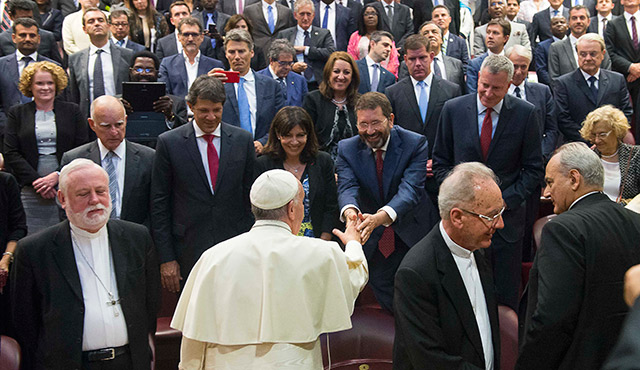When it comes to defending the environment, Pope Francis doesn’t mince words or pull punches.
“The Earth, our home, is beginning to look more and more like an immense pile of filth.”
This is but one of the many powerful statements made by the pope in Laudato Si’ (“Praised Be to You”), an encyclical that was released on June 18. While encyclicals are essentially open letters traditionally addressed from the Vatican to more than a billion Catholics, Pope Francis saw the need to address this one, subtitled “On Care for Our Common Home,” to everyone on the planet.
And, many believe, not a moment too soon.
Calling for a widespread “ecological conversion” of the faithful, the pope notes that, “Each year sees the disappearance of thousands of plant and animal species which we will never know, which our children will never see, because they have been lost forever.”
“The pope says that every person in the world needs to be involved and concerned,” says Sister Nadine McGuinness, CSJ, a theologian and educator at St. Joseph Center in Orange. She is one of the speakers at a free community forum and presentation dealing with the encyclical that will take place on August 8. “Be upset,” she says. “Be conscience-stricken that our Earth is being treated so abysmally.”
The event, scheduled to take place at Christ Cathedral campus’ Cultural Center from 2 to 5 p.m., will focus on the theology of the encyclical and the worldwide impact of climate change on the poor. In addition, it will help build a scientific understanding of climate change and offer practical steps for individuals, as well as provide ideas and resources for parish and community engagement.
Laudato Si’ is in line with the pope’s relatively progressive stances on such issues as the global economy, an element that he says must change to help the poorest inhabitants of an embattled Earth. This call from Pope Francis is not only a religiously important document for people of faith, the encyclical’s publication is a culturally significant challenge for all Americans, since, among many other recommendations, it urges the kind of activities that environmentalists have been stressing for decades: using public transportation or carpooling, planting trees, recycling, installing low-energy lights and so forth. If we continue on the path we’re headed, the pope sternly warns, our very future as a human species and as a planet will be threatened.
The August 8 forum’s scientific element is not accidental: It will point out the importance of the fact that the pope, who has a technical degree in chemistry and once worked as a chemist, leans heavily on scientific arguments in his encyclical, which calls for a new partnership between religion and science to combat human-driven global warming. “Plenty of scientific studies point out that the last decades of global warming have been caused by the great concentration of greenhouse gases,” the encyclical notes, “especially generated by human action.”
“The pope speaks with a voice that many people listen to,” says another of the event’s speakers, Dr. Tony Strawa, past chair of the Diocese of San Jose Climate Change Initiative and a research scientist with more than 15 years of experience studying this issue. “[Pope Francis] has a unique perspective – and a global flock, many of whom are suffering because of the changing climate.”
Following opening remarks by Bishop Kevin Vann, the forum will include a theological reflection on Laudato Si’ by Sister Nadine McGuinness, a talk by Strawa on the science behind climate change and a discussion about the impact of climate change on the poor by Joan Rosenhauer, Catholic Relief Services’ Executive vice President of U.S. Operations.
In the encyclical, Pope Francis backed up his science with biblical verse, arguing that some Christians have misinterpreted Scripture: “We must forcefully reject the notion that our being created in God’s image and given dominion over the Earth justifies absolute domination over other creatures.”
The pope’s document is not without its detractors, however.
“The pope is putting his moral authority behind the radical environmental agenda of the United Nations, and he’s doing it after being told only part of the climate story,” says Jim Lakely, a spokesman of the Heartland Institute, a conservative group skeptical of climate change.
And former Pennsylvania Sen. Rick Santorum, a Catholic, said the pope should “leave science to the scientists.”
But should he?
“The pope is talking about faith,” says Strawa. “He is talking about the moral issue that is climate change. I don’t think you can draw, especially in this issue, the line between politics and science and morality. These things are interrelated.”
“Pope Francis is saying to us that this is a moral issue,” Sister Nadine says. “When you recognize that 95 percent of the writing scientists, those who are engaged and involved in true science and the environment, believe in global warming, how can someone who knows so little say, ‘I don’t believe in it’? We have to look at the evidence and the responsible indications that there is something serious going on.”
Those interested in attending the community forum can RSVP at praisebetoyou.eventbrite.com.

